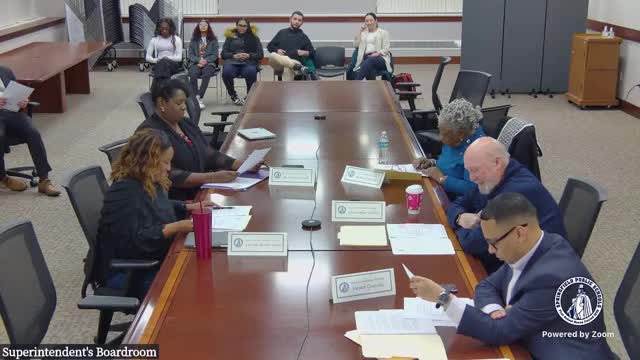School committee reviews MOU rewrite to limit Springfield Police access to school security cameras
Get AI-powered insights, summaries, and transcripts
Subscribe
Summary
The Springfield School Committee on an agenda item opened a working session on revising the interdepartmental memorandum of understanding that governs Springfield Public Schools’ (SPS) security cameras and Springfield Police Department (SPD) access.
The Springfield School Committee on an agenda item opened a working session on revising the interdepartmental memorandum of understanding that governs Springfield Public Schools’ (SPS) security cameras and Springfield Police Department (SPD) access.
Committee attorney Ian Keith, representing the school committee, said the review focused on three core concerns: “we wanna make sure it's more transparency. We wanna know when the cameras may be accessed, who's gonna access them when a record of the and a record of the access.”
Why it matters: Committee members and community speakers pressed for explicit language to prevent routine police use of school camera footage and to protect student privacy. Members asked the attorneys and SPS staff to make clear which kinds of video become education records under the Family Educational Rights and Privacy Act (FERPA) and when SPD or its real-time analysis staff may view live or stored footage.
Most of the discussion centered on three technical issues. First, attendees sought clearer wording that video is not automatically a student education record simply because it contains images of students; instead it becomes a student record only when it is “directly related to a student” or used for a discipline or education purpose, as attorney Ian Keith explained. Second, the group debated language that limits disclosure to law enforcement to the FERPA public-safety exceptions (for example, where there is an “articulable and significant threat to the health or safety of a student or other individuals”), and to make clear that footage accessed for that purpose may not be repurposed for unrelated disciplinary uses. Third, the committee pressed for a clear operational distinction between real-time access and later requests for stored footage.
Bill Schwartz, who runs the city’s real-time analysis unit, clarified operational practice: the real-time camera access is performed by civilian real-time crime analysis staff and a video analyst, not by uniformed officers. “There are no police officers in that room. There are no police officers that have access. We run the credentials,” Schwartz said. He and other staff described a technical audit trail: when an analyst selects a camera, credentials and a time stamp are recorded in both the school’s system and the real-time center’s system. Committee members asked for stronger language in the MOU to require notification to the superintendent’s office after any access and to make that audit trail and reporting explicit in the agreement.
Committee members repeatedly sought wording changes to fix inconsistent acronyms and to ensure the MOU covers “any and all SPS buildings and property,” not only classrooms or traditional school facilities. Attorneys agreed to standardize names and acronyms in the draft.
Several members pressed for explicit limits on who may access live feeds, distinguishing daily operational review by school administrators and SROs (school resource officers) from the MOU’s subject: civilian-run real-time analysis access during major life-safety incidents. As one committee member summarized, the committee wanted the MOU to address the narrow public-safety use case — for example active shooter or a major life-safety incident — and to be explicit that routine disciplinary reviews remain in the school’s operational procedures or in a separate SRO MOU.
Attorney Hannah Murray (school legal counsel) said the SROs operate under a separate memorandum and that the team would check for conflicts between the two agreements so the MOU under discussion does not inadvertently hamper SRO operations.
Next steps: The committee asked attorneys to reword the draft to (1) standardize party names and acronyms, (2) clarify the conditions that make footage a student education record under FERPA, (3) add explicit public-safety exception language, (4) require a documented audit trail and notification to the superintendent’s office for access to interior and exterior cameras, and (5) spell out that real-time live access is restricted to civilian real-time crime analysis staff and the SPD video analyst. Attorneys committed to prepare an updated draft that reflects the committee’s requested clarifications and to bring it back for further review.
Ending: Committee members said they will resume review once the attorneys provide the revised MOU language and asked to include explicit archival-location and reporting language so the public record will show who accessed cameras and why.
